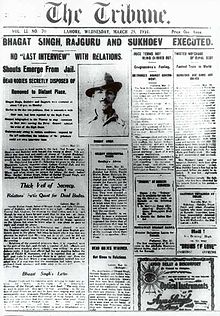Hans Raj Vohra
In May 1930, his statement against Bhagat Singh, Sukhdev Thapar and Shivaram Rajguru, in the Lahore Conspiracy Case trial, became "crucial" in leading to passing of their death sentence .
[3] Against the wishes of his father, Vohra became a trusted colleague and follower of the leading revolutionaries Sukhdev Thapar and Bhagat Singh.
He was subsequently inducted into the Hindustan Socialist Republican Army and became a revolutionary organiser primarily arranging the distribution of leaflets and literature, in Punjab Province in the 1920s.
Although not directly involved with the bombing, Vohra,[7] then working in the offices of Bande Mataram ,[8] knew of its details through Sukhdev, and after his second arrest in May 1929, closed his testimony and "tendered pardon, the conditions of which I accepted".
In 1981, before he died, he addressed a letter to Sukhdev's brother, explaining why he testified and expressed the wish to be forgotten:[3][12] Mine has been a most difficult life, full of risks, but so far touch wood, I have emerged virtually unscathed, at least physically.
But the memory of the twenties accompanies me doggedly, teasingly and hauntingly….I hope by the time I die, I would have been fully forgotten, This is my only ambition.
